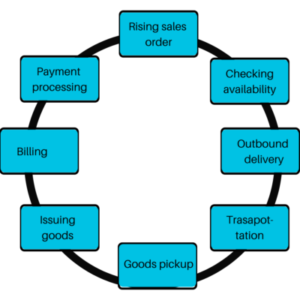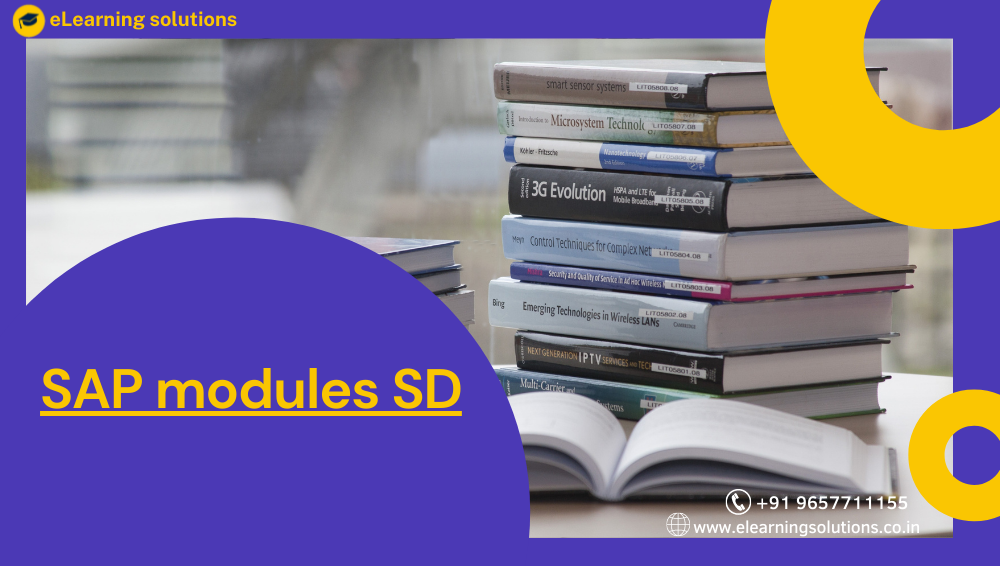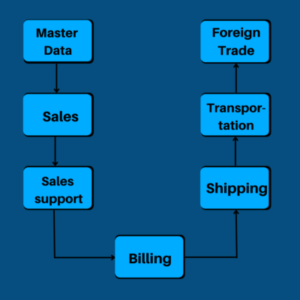A variety of modules comprise the SAP ERP (Enterprise Resource Planning) system. Each lesson focuses on a different aspect of a SAP-enabled business. Finance Accounting, Controlling, Production Planning, Materials Management, Business Intelligence, Human Resources, and other modules are among them. SAP modules SD. SAP Sales and Distribution is a crucial component of the SAP ERP system, and it is used to manage the shipping, billing, selling, and transportation of products and services inside a company.
The SAP Sales and Distribution module, which is part of the SAP Logistics module, maintains client relationships from quote through sales order and product or service billing. Other SAP modules, such as SAP Material Management and PP, are tightly connected with this module.
Key Components of SAP Module SD
The SAP SD module is the most vital ERP module developed by SAP. It helps in better management of sales and customer distribution data and processes in organizations.
The important components in SAP Sales and Distribution module are:
- Master Data
- Sales
- Shipping of Material
- Billing-Related
- Sales support
- Transportation of products
- Foreign Trade
SAP Sales and Distribution Cycle

SAP Modules SD
SAP ERP Sales and Distribution is a module inside the logistics module that aids clients with bids, sales orders, and invoicing concerns. It works in tandem with the MM and PP modules. It allows businesses to change their sales prices as well as track open orders and other forecasts.
One of the most well-known SAP R/3 services modules is Sales & Distribution (SD). This module is made up of sub-modules, which are individual components. These are some of them:
SAP-SD-MD (Master Data): Each SAP modules SD user has master data that tracks all of the data’s transactions. Customer and material data, a record of price conditions, and credit management are all part of the SD master data. Order and cash processes are included in this module.
SAP-SD-BF (Fundamental Tasks): SAP modules SD setup results in an efficient procedure for all basic sales and distribution functions. Pricing, output, and other fundamental functions are examples of basic functions. The quantity of price that was utilised for a certain sale, as well as the production that resulted from it, and so on.
SAP-SD-SLS (Sales): As the name implies, SAP modules SD sales is in charge of the finer points of every sale. Everything is tracked through this module, from product specifications to client information, price, comments, and the sales process.
SAP-SD-TBA (Transportation): This component is linked to the shipping component. Each product’s mode of transportation is unique, and this module keeps track of all transportation information.
SAP-SD-SHP (Shipment): Sales and shipping and delivery are inextricably linked. A product must be sent and delivered correctly to the consumer. There are several shipping methods, and this module keeps track of each product utilized for each delivery. This module keeps track of the whole process, from shipment through delivery and return.
SAP-SD-FTT (Foreign Commerce): This component assists a department in managing data linked to international trade, including both imported and exported goods. This module is best suited for businesses that deal with international commerce.
SAP-SD-BIL (Billing): Billing is the most important aspect of every transaction. Consumers have the option of paying via online media or cash on delivery. This module keeps track of all the billing information in an organization in the proper manner.
SAP-SD-CAS (Sales Support): Customers contact with the sales team on a regular basis, from selling a product to maintaining it for a process. Customers connect with the sales team on a regular basis, from selling a product to keeping it for a process. This module records and reports the information exchanged between the sales staff and customers when providing product support.
Sales Order Processing
Order processing starts with recording the actual sales order or sales request, Sales orders are recorded either by Back office staff or sales team or directly.it could be by the customer via a web application, or electronic data interchange (EDI). or XML interface. The sales order contains customer, partner (sold-to, ship-to, bill-to, payment terms), material, quantity, pricing, delivery date, and shipping and transportation information required for delivery. Material/ Product availability check is performed at the time of the order creation triggering the potential procurement requests as needed. The requirements created by the sales order can be filled from available in-house stock inventories procured by the replenishment team.
Also read SAP module SD integration with other Modules
What is SD Integration with MM in SAP?
SD Integration with MM
- All the information of the products are taken from the Material master of MM when we generate a sales order in SD.
- Data for MRP and availability checks is likewise obtained from MM, however you may regulate this data in SD as well.
- When you produce an inbound/outbound delivery based on a sales order, the shipping location is determined using the loading group, plant data, shipping circumstances, and other factors. The Material Master is also referred to as this.
- If you don’t extend the material you’re placing in a sales order to the sales area of your sales order/customer, you won’t be able to transact with it.
What is SD integration with PS in SAP?
SD integration with PS (SAP modules SD)
- Billing strategy at the network and activity levels for each WBS element.
- The item category is given to a DIP profile. Only ECP and DIP work together for resource-related quotations ( easy cost planning).
- Sales Pricing – In PS, there are two different forms of sales pricing. There are two types of contracts: lump-sum and unit rate.
- BOS stands for Bill of Services, and it must be active. It’s a solution tailored to the industry. If BOS is enabled, you can also use it for vendor RFQ and analysis.
- Billing for Resources
What is SD integration with MM & FI in SAP?
SD integration with MM & FI
- The movement of goods happens in the background whenever you establish a delivery & post goods problem. E.g. movement type 601 occurs when typical items are issued. In MM, this movement kind is set up. This movement type also affects the FI “Cost Of Goods Sold” G/L account. Every time a shipment moves, it is recorded in the applicable G/L account.
- Accounts are posted to FI using billing papers (invoices, debit notes, credit notes, and so on) prepared in SD. The applicable Revenue & Receivable G/L accounts are updated with the values.
- In the sales and distribution module, all billing transactions will result in FI Posting. All billing accounting entries will have one side of the account as a client or receivable and the other side as a payable to be a revenue account.
What is SD integration with PP in SAP?
SD integration with PP
- Material needs (Transfer of requirements) are formed when a sales order is created, and they are subsequently transferred to production planning.
- In the requirement class, we must set the specifics of how we wish to deliver the specs to production planning.
- Production planning is developed based on the sales need when we use the MRP (Transaction Code MD02) software.
When a sales order is established, for example, for completed goods that we make in-house, planned orders for the line items in that order are produced. The list of stock needs may be seen using T-code MD04. The list we see in it is due to the MRP being performed. MD02. Coding is possible on T.
These needs, also known as planned orders, are now being turned into production orders. If available, whatever raw materials are required to make those line items will be tested; otherwise, the demand will be forwarded to MM, who will then forward it to a vendor. Following their arrival, production begins, and after quality control, the stock is released for unrestricted usage. And the cycle continues.
What is SD integration with WM in SAP?
SD integration with WM (SAP modules SD)
- Once the outbound distribution process is up and running,
- When cross-docking transfer orders are made and confirmed, the associated deliveries are updated.
- Transfer the contents from containers to temporary storage form 916, and lastly confirm the TO with a transportation order (the outbound delivery serves as a request for transportation).
What is SD integration with QM in SAP?
SD integration with QM (SAP modules SD)
- Before the completed items are shipped to the client, a random final inspection will be performed.
- When the items are delivered to the end consumer, and if there are any quality concerns and the customer returns the item, a quality inspection will be performed on the customer’s request. A needed quality notification will be triggered for this SD, and the message will be forwarded to quality.
Is SAP SD a good career?
Yes, SAP SD can be a good career choice for individuals interested in sales and distribution processes and working with the SAP ERP system. It offers potential job opportunities, growth prospects, and the chance to work with a widely used module in various industries. However, the actual suitability and success of a career in SAP SD depend on individual factors such as skills, market conditions, and personal preferences.
Know more about the SAP module SD module syllabus
Interested in SAP and Oracle Courses? Fill Your Details Here
Error: Contact form not found.
Find Your Preferred Courses
SAP SD S4 HANA
SAP HR HCM
Salesforce Administrator Training
Salesforce Developer Training
SAP EWM
Oracle PL-SQL Training Program
Pega Training Courses in Pune- Get Certified Now
SAP PP (Production Planning) Training Institute
SAP Basis Training in Pune
Courses For Sap HANA Administration Training
Courses For Sap BW On HANA Training
Courses For Sap Hana Simple Logistics Training
Courses For Sap ABAP On HANA Training
Courses For Sap Hana Training
Oracle HRMS (Human Resource Management System) Course Details, Syllabus and Fees
Oracle Apps SCM (Supply Chain Management) Training & Certification Courses
Oracle Apps R12 Technical Training Course and Module Overview
SAP FICO ( Financial Accounting) Online Training And Certification in Pune
SAP SD (Sales & Distribution) Training Course Admission Details
Be an Certified Professional in SAP WM (Warehouse Management)
Training for SAP MM (Material Management) Course Modules
SAP ABAP Training Institute in Pune, SAP ABAP Courses Online





 WhatsApp us
WhatsApp us